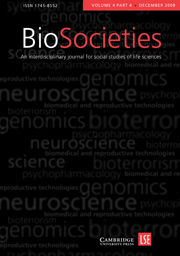Article contents
Somatographic Investigations Across Levels of Complexity
Published online by Cambridge University Press: 23 July 2016
Abstract
The methods and theoretical repertoire of the biomedical sciences are undergoing rapid change fuelled, first and foremost, by advances in genomics and molecular biology. At the same time, social and environmental phenomena are being incorporated in new ways into medical frames of reference affecting professional practice as well as regimes of prevention and health promotion. In turn, these developments impact upon the social sciences and humanities concerned with new forms of dynamic corporealities in social and medical practice. This article outlines in a programmatic fashion three sets of issues that are likely to acquire significant relevance in this context: (1) looping effects will emerge along different pathways between medical diagnosis, selfhood, social practice and the body itself. The investigation of these dynamic interactions has so far received little attention in the social sciences and will require the development of a different methodological approach to do justice to different kinds of data and long-term effects. (2) Advances in the understanding of epigenetic regulation have begun to fundamentally change notions of inheritance and development and to differentiate the central dogma of genetics (DNA makes RNA makes Protein), with significant implications for notions of interand intra-generational responsibility and biographical time regimes. (3) The incorporation of ‘things social’ into medical domains is being taken to a new level of significance, fuelled by a number of fundamental shifts in medical reasoning and practice. The social sciences’ current focus on (epi)genetics can only be a starting point for a broader interdisciplinary agenda to better understand the pathways through which ‘the social and cultural’ enters the body. The final section of this article discusses somatography as a practice-oriented approach attempting to address some of these issues in a symmetrical investigation across epistemic cultures.
- Type
- Articles
- Information
- Copyright
- London School of Economics and Political Science
- 31
- Cited by


